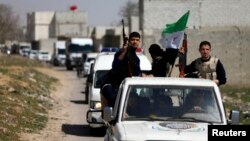An operation to air drop critical relief supplies into Deir ez-Zor, the eastern Syrian city under the control of Islamic State militants, is still in the planning stage, but the World Food Program says it is working around the clock and hopes to start the operation next week.
The U.N. agency says the last time it reached Deir ez-Zor was in May 2014.
The airdrop operation aims to reach up to 200,000 people who are being denied food, medicine and other vital supplies by Islamic State, according to WFP spokeswoman Bettina Luescher. The militant group, however, will not allow humanitarian aid into the city.
"This will be a high-altitude operation where we will be dropping off lifesaving aid supplies with parachutes,” she said. “We will be using a plane that is especially equipped for this kind of high-altitude operation. We will be working with flight crews that are highly experienced."
The operation will use a WFP-registered company that has experience with airdrops in dangerous places, such as South Sudan, and knows how to maneuver safely, Luescher said.
The Syrian Arab Red Crescent and local partners will prepare and distribute the airdrops on the ground.
It is urgent for the operation to succeed, as the trapped inhabitants of the besieged city are desperate.
"We know that there are critical food shortages for the people on the ground, as small military helicopters sometimes fly in food that is being sold for prohibitively high prices,” Luescher said. “Food is sometimes 16 times more expensive than before the surge. And that, of course, means that many families simply cannot afford to buy it. So they urgently need humanitarian assistance."
Airdrops are always a measure of last resort. Luescher said WFP would much rather transport food by truck because land routes are usually easier, safer and more cost-effective; however, going by land into the IS stronghold is not possible, given the dangers implicit in the operation.




